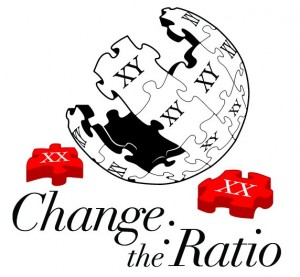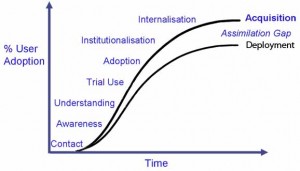
Commence beating the figurative dead horse. As I’ve written previously, (here, here and here) Wikipedia is suffering from a lack of female contributors (less than 1 in 10 editors are women, per the 2011 Wikimedia survey). This has the unfortunate consequence of compromising the overall quality and objectivity of its content, as illustrated in my post, How I Redefined “Man” for The World.
While there are several reasons offered for why women aren’t editing (Sue Gardner, Executive Director of the Wikimedia Foundation, recently gave an interview to CBC highlighting these and summarized them in her post Nine Reasons Why Women Don’t Edit Wikipedia), half of them I just laugh at. Women are too busy? I’ve spent enough hours at Starbucks to observe the gratuitous amount of time some women devote to Facebook. Or, women are conflict-averse and don’t like Wikipedia’s sometimes-fighty culture? As Denis Leary so eloquently stated in The Thomas Crown Affair: “Life is full of sh$tty conflicts, okay?” It’s not an excuse.
So what would I do if I was running the “Change the Ratio” Wikipedia campaign? For one, I’d be focusing on the initial phases of the technology adoption curve: awareness and understanding, in the form of education.
Awareness
Simply put, there needs to be more recognition and media coverage of the issue, illustrating the societal impact of not having women (as well as other demographics) editing Wikipedia. Taking a cue from Simon Sinek, I’d be making it clear to women why it matters. And then I’d enlist some influential voices to help the reach the target audience: women.
- Who better to get the word out than the mother of influence on all things women, education and action, Oprah. The issue is right up her alley. She does Twitter, she does Facebook, so why not Wikipedia? Can you imagine Jimmy Wales or Sue Gardner sitting down with Oprah (and Gayle) for a tutorial on Wikipedia and releasing a 2-minute video of it?
- In the event Oprah isn’t available, an “I Edit Wikipedia” compilation video of some of the most influential women in tech would make a statement. Ladies like Sarah Lacy, Danah Boyd, Jolie O’Dell, Laura Fitton, Tara Hunt, Sheryl Sandberg, and Marissa Mayer. I wonder who of these industry leaders edits, versus who doesn’t?
Then there’s the use of social media to spread the word.
- The awesome folks at JESS3 worked with me on the Wikipedia: Change the Ratio logo (you can see all the versions here), and next week we’ll be spreading the word via a Facebook initiative for users to change their profile pics (and Twitter avatars and whatever else) to it on Ada Lovelace Day (Friday, Oct 7) which celebrates the achievements of women in Science, Technology, Engineering and Mathematics.
Again, the point is awareness.
- And to celebrate Wikipedia women rockstars, we created a set of barnstars for contributors with 100, 1,000 and 10,000 edits (you can see all the versions here). Below are my top 3:
- Finally, it wouldn’t hurt if Wikipedia made edits easily shareable by adding some version of a “Share This” button in the Edit mode, integrated with the most prominent social media services for female (and male) influencers to share the pages they contribute to.
Education
It’s essential. Wikimarkup can be a little intimidating for those not familiar with “code” and having edits reverted can be off-putting, but neither of these factors are something that can’t be addressed with a small dose of education.
- In 2010, the Wikipedia Foundation launched a pilot project to explore the potential of formally using Wikipedia as a teaching tool in higher education but I think education at a grassroots level is more important.
- Half-day workshops like the one we hosted at JESS3 are something local Wikipedia chapters can embrace, with a proven format and curriculum available. And there doesn’t even need to be formatted sessions. In the same vein of SuperHappyDevHouse, folks can just get together and help each other out, using it as an opportunity to have fun, learn, build, and meet new people.
- There are tons of YouTube videos and internet guides on how to edit and get started with Wikipedia. I even created my personal Seven Essential Steps to getting started with Wikipedia.
NOTE: For those interested learning more about the gendergap issue, you can subscribe to the gendergap mailing list. The discussion threads provide incredible insight into what’s going on, everything from harassment on women’s user pages to inappropriate sexualization of images for topical pages.




Great post Amy. We can do our part for awareness here by continuing to write about Wikipedia on 1X57. It would be cool if some other, bigger sites did it as well.
adding some version of a “Share This” button in the Edit mode, integrated with the most prominent social media services for female (and male) influencers to share the pages they contribute to
Gahh!!!! This would encourage all the worst tendencies of braggarts, showoffs and vandals to edit for egoboo, rather than in order to add to human knowledge. My experience is that the best editors are nearly-invisible except insofar as their edits and comments are valuable to their colleagues and the ordinary readers.